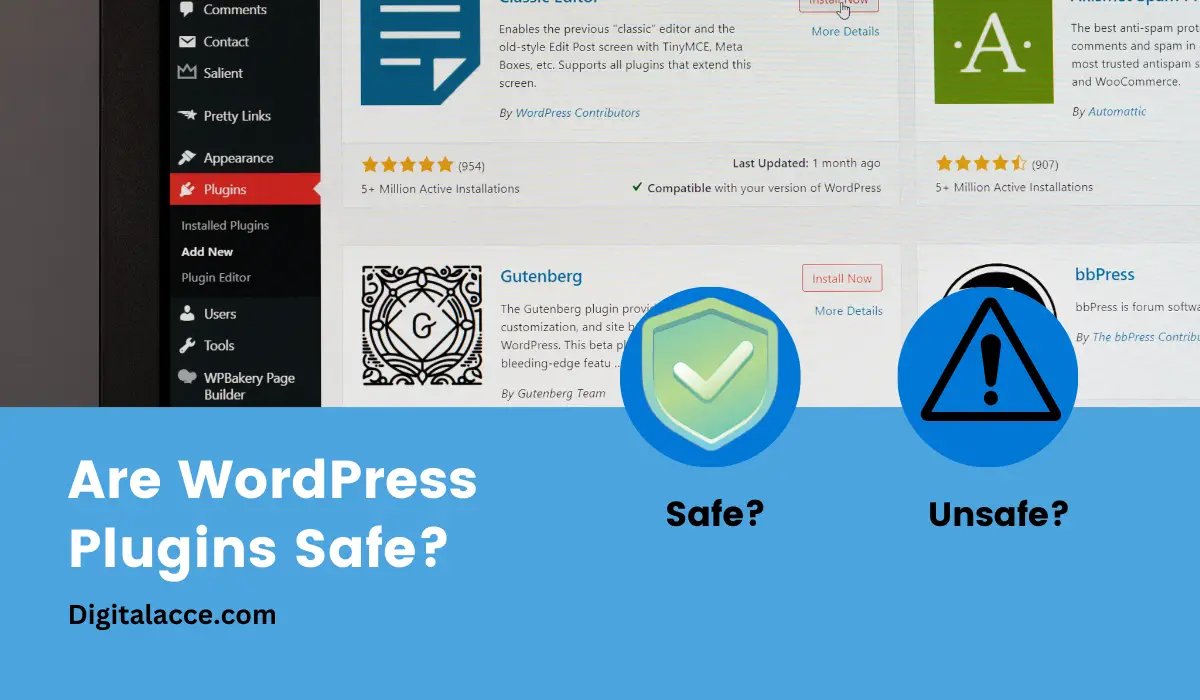Are you running a WordPress website and wondering if your plugins are safe? With the vast array of plugins available in the WordPress Plugin Repository, it’s easy to feel overwhelmed and unsure about which ones to use. As convenient as these plugins are, they can also pose significant risks to the security and stability of your website.
In this article, we will delve into the topic of WordPress plugin safety and discuss the risks associated with using them.
We will also explore best practices and recommended security measures that can help you identify safe plugins and ensure the overall safety of your website. So, are WordPress plugins safe? Let’s find out.
Contents
- Are WordPress Plugins Safe?
- Does WordPress vet the security of plugins?
- My Personal Experience
- Risks Associated with Using WordPress Plugins
- Factors Affecting the Safety of WordPress Plugins
- Quality of source code and development practices
- Recommended Security Measures for WordPress Plugins
- Best Practices for Selecting and Using WordPress Plugins
- Conclusion
Are WordPress Plugins Safe?
WordPress plugins can be safe if they are developed by reputable developers, regularly updated, and used correctly. However, just like with any other software or online service, WordPress plugin have their own risks.
The safety of a WordPress plugin largely depends on its source code and how it was developed. Plugins that are well-designed and adhere to best practices for WordPress development are more likely to be safe and reliable. Additionally, plugins that are frequently updated are more likely to be safe as developers can quickly patch security vulnerabilities and bugs that arise.
However, there are risks associated with using plugins that are poorly developed, outdated, or from unknown sources. These plugins may contain security vulnerabilities that could be exploited by hackers, causing damage to your website or compromising sensitive information.
Does WordPress vet the security of plugins?
While WordPress has a repository of plugins that are available for download, they do not vet the security of every plugin in the repository.
However, they do have some security measures in place to help protect users. For example, they require that plugins go through a code review process before acceptance into the repository, and they have guidelines in place that plugins must adhere to.
Additionally, they have a team of volunteers who actively monitor the plugin repository for security vulnerabilities and other issues, and they work with developers to address any problems identified.
However, it is ultimately up to you to assess the safety of a plugin before installing it on your website.
Read Also: Learn How WordPress Multisite Works
My Personal Experience
One day, I noticed that one of my websites was running slower than usual, and some of my pages were not loading correctly. I immediately contacted my hosting provider, but they couldn’t find any issues on their end. It wasn’t until I started digging deeper into my website’s plugins that I discovered the problem.
One of the plugins that I had installed was outdated. Hackers exploited this vulnerability and injected malicious code into my website, causing it to slow down and behave erratically.
I immediately removed the plugin and contacted a security expert to help me clean up my website. It was a stressful and costly experience, and I realized how important it is to regularly update and check the safety of my WordPress plugins.
This experience highlights the essence of this blog post, which is to discuss the safety of WordPress plugins and provide best practices and security measures for ensuring their safety.
Risks Associated with Using WordPress Plugins
WordPress plugins can significantly enhance the functionality and performance of your website, but they also pose significant risks to its security and stability.
Here are some of the risks of using WordPress plugins:
Security vulnerabilities
Plugins can contain security vulnerabilities that hackers can exploit to gain access to your website, inject malicious code, or steal sensitive information.
Compatibility issues
Some plugins may not be compatible with your website’s theme or other plugins, causing conflicts that can lead to errors or crashes.
Performance issues
Using too many or poorly coded plugins can slow down your website’s performance, resulting in a poor user experience and a loss of traffic.
Malware infections
Some plugins may contain malware or be used as a vector for distributing malware, which can cause significant damage to your website and its visitors.
These risks underscore the importance of using safe and reputable WordPress plugins, regularly updating them, and implementing additional security measures to protect your website and its visitors. By being vigilant and taking proactive measures, you can minimize the risks associated with using WordPress plugins and ensure the overall safety and stability of your website.
Factors Affecting the Safety of WordPress Plugins
When it comes to the safety of WordPress plugins, several factors can impact their security and stability. Here are some of the key factors to consider:
- Plugin source: Plugins from reputable sources such as WordPress.org or well-known plugin developers are generally safer than plugins from less reputable sources.
- Plugin reviews and ratings: Reviews and ratings from other users can provide insight into a plugin’s security and reliability.
- Plugin compatibility: Check for compatibility with your website’s theme and other plugins to avoid potential conflicts and errors.
- Plugin updates: Regular updates can address security vulnerabilities and improve the overall stability of a plugin.
- Plugin developer support: Look for plugins with active and responsive support from their developers to address any issues or concerns that arise.
- Plugin Complexity: Avoid overly complex plugins with many features you don’t need, as they can increase the risk of security vulnerabilities and compatibility issues.
Quality of source code and development practices
In addition to the factors mentioned earlier, the quality of source code and development practices of WordPress plugins can significantly impact their safety. Here are some key considerations:
- Code quality: Plugins with well-written and well-documented code are generally safer and more reliable than plugins with poorly written or unorganized code.
- Security practices: Look for plugins that adhere to secure coding practices and incorporate security features such as data encryption, input validation, and protection against SQL injection attacks.
- Testing and quality assurance: Plugins that undergo rigorous testing and quality assurance processes are less likely to contain bugs or security vulnerabilities.
- Development team expertise: Plugins developed by experienced and knowledgeable developers with a strong understanding of WordPress and its security best practices are generally safer and more reliable.
- Transparency: Developers who are transparent about their development practices, update schedules, and security measures are generally more trustworthy and reliable.
Recommended Security Measures for WordPress Plugins
WordPress plugins can introduce vulnerabilities to your website, so it’s important to implement additional security measures to protect your site and its sensitive information. Here are some recommended security measures for WordPress plugins:
- Use a reputable security plugin: A reputable security plugin can help protect your website from malware, brute-force attacks, and other security threats.
- Use strong passwords: Ensure that all user accounts, including administrator accounts, have strong, unique passwords that are difficult to guess.
- Implement two-factor authentication: Two-factor authentication adds an extra layer of security to your website login process, requiring users to enter a code in addition to their password to access the site.
- Regularly update plugins and WordPress core: Keep your plugins and WordPress core up-to-date to ensure you have the latest security patches and bug fixes.
- Use HTTPS: HTTPS encrypts your website traffic, protecting sensitive data from interception by third parties.
- Limit login attempts: Limit the number of failed login attempts to prevent brute-force attacks against your website login.
- Backup regularly: Regularly back up your website to ensure you can quickly recover in the event of a security breach or other issue.
Best Practices for Selecting and Using WordPress Plugins
Selecting and using WordPress plugins can be a significant asset to your website’s functionality and user experience, but it’s important to follow best practices to ensure their safety and stability. Here are some essential best practices for selecting and using WordPress plugins:
- Research the plugin’s source, reviews, and ratings before installing it.
- Check the plugin’s compatibility with your website’s theme and other plugins.
- Regularly update your plugins to ensure they have the latest security patches and feature enhancements.
- Look for plugins with active and responsive support from their developers.
- Avoid installing too many plugins or unnecessary features.
- Regularly back up your website to ensure quick recovery in the event of any issues.
- Implement additional security measures such as using a reputable security plugin, strong passwords, and two-factor authentication.
- Host your websites on a super fast, dedicated and independent server.
- Break free from cheap and slow Shared hosting service.
- Enjoy Pay as you use Cloud hosting service for a token.
- Get $25 FREE after signup.
Conclusion
Are WordPress Plugins safe? Well, as you may have learned in this blog post, WordPress plugins are can be safe but then there could be some vulnerabilities.
However, by following the best plugin security practices outlined in this post, you are sure to have a safe website.
In case you found this article helpful, you may also find out how to fix the WordPress JQuery issue, Caching issues, and Password Reset issues.




